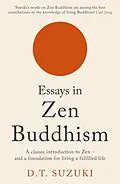'Suzuki's works on Zen Buddhism are among the best contributions to the knowledge of living Buddhism' Carl Jung
Essays in Zen Buddhism was the first book to fully introduce Zen in the West. In it, Dr D.T. Suzuki outlines the origins of Zen as a unique Chinese interpretation of the Doctrine of Enlightenment with the aim of attaining Satori ('Sudden Enlightenment'). He describes how Satori can be achieved and the methods that can bring it about - but always stresses that Zen has to be a way of life that can cope with the demands and frustrations of everyday life.
Exploring the history of Buddhism, the daily life of a Zen monk and the path to enlightenment, Essays in Zen Buddhism offers an understanding of Zen not as a religion but as a way of perceiving, acting and being. It is both a classic introduction to Zen and a foundation for living a fulfilled life.
After reaching enlightenment at the age of 27, Dr Suzuki spent the next 65 years writing about Buddhism and teaching in universities in Europe and the US. Widely regarded as the twentieth century's leading authority on Buddhism, he was nominated for the Nobel Peace Prize in 1963.
Autorentext
Daisetz Teitaro Suzuki (11 November 1870 - 12 July 1966) was a Japanese author of books and essays on Buddhism, Zen (Chan) and Shin that were instrumental in spreading interest in Far Eastern philosophy in the West. Suzuki was also a prolific translator of Chinese, Japanese, and Sanskrit literature. He was nominated for the Nobel Peace Prize in 1963.
